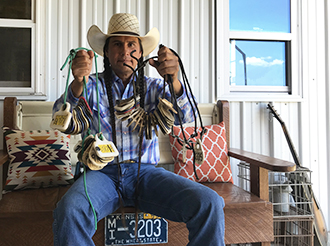On a breezy summer morning, I sat across from a figure clad in blue jeans, cowboy boots and a cowboy hat. His long, black braids trailed past his waist. He held more than 50 numbered ID tags, each representing a four-legged soul saved.
Every year, the Bureau of Land Management (BLM) rounds up herds of wild horses on public rangelands, usually with helicopters. Those horses who survive the roundup are tagged with a number and contained in BLM holding pens for an indeterminate amount of time, forever separated from the family groups (called herds) that bound them together in the wild.
The BLM holding pens contain around 47,000-49,000 horses at a staggering annual cost of now more than $80 million. Read the BLM 2016 budget justifications report here. Less than 5 percent are adopted out each year, and although the BLM has policies in place to prevent these cases, some horses end up in slaughterhouses outside of the United States’ borders.
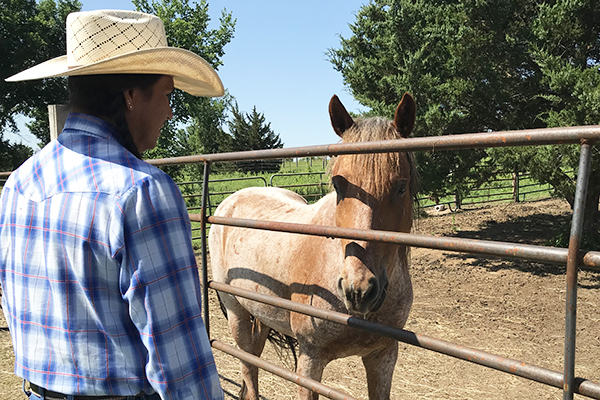
For a lucky few, the CANA Foundation’s “re-wilding” process saves them from holding pens and slaughterhouses and returns them to native lands.
The CANA Foundation “rescues, re-wilds, and re-homes wild horses in order to improve their quality of life and ensure that they can live with dignity in a protected habitat, free from the risk of slaughter and out of Bureau of Land Management (BLM) holding facilities.”
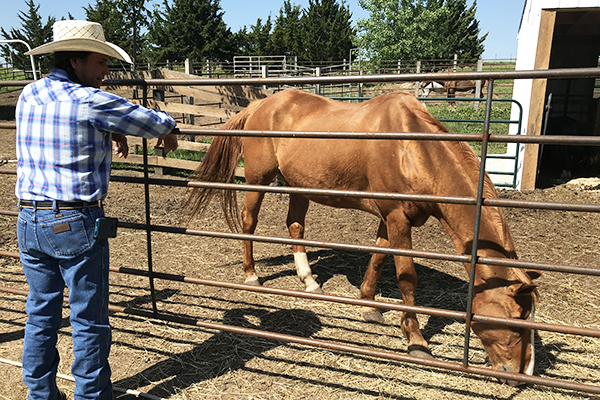
CANA’s re-wilding mission also acknowledges that through saving the horse, humanity is also saved: “re-wilding represents the belief that through protection of our indigenous species, conservation of our land and natural resources, and reconnecting to our native cultural heritage and traditions, we can restore balance to our environment and ourselves.”
As he sat across from me with the numbered ID tags, Moses Brings Plenty, a Lakota spiritual leader and CANA’s director of relations and rangeland acquisitions[1], described what re-wilding means specifically for him and Native people: “we’re trying to reawaken [the source of life] . . . and take back our rights of being free . . . and the horse plays a big, vital role in that.”
As Brings Plenty elaborated, wild horses retain the knowledge of Native culture and by saving them, Native people are saving themselves mentally, emotionally and spiritually through preserving their culture and reconnecting to traditional ways. This cultural preservation and reawakening will then help reestablish community and counteract the societal ills (substance abuse, domestic violence, crime, suicide, diabetes, unemployment, poverty, etc.) that plague Native populations.
Brings Plenty explained that Native people are also saved physically because the wild horse reawakens and rejuvenates nature too. The horse spreads the natural, native grass seeds, and their hooves help plant the seeds into the ground, transforming the land back into its original state.
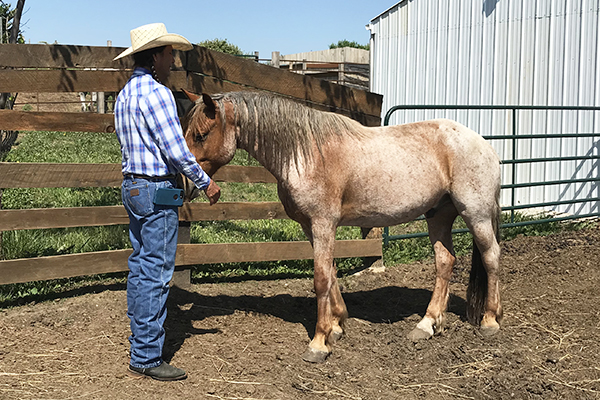
Two ID tags hold particular significance to Travois — those of Maestro and Palomino — male horses who were rounded up last October from their homelands in Wyoming, sterilized, and placed in a BLM facility. View a photo of Maestro & Palomino here.
Travois helped contribute the funds CANA needed to outbid the “kill buyer,” who represented a slaughterhouse, at the BLM internet auction in order to save these horses. Brings Plenty and the CANA team completed the horses’ re-wilding earlier this year to a 9,000-acre sanctuary in Oregon to live out their days in peace.
Even though the two horses had been given a life better than a holding pen, Brings Plenty recalled being overcome with emotion at how his hooved “relatives” had been stripped of everything they held dear, similar to the cultural stripping his people have experienced throughout history.
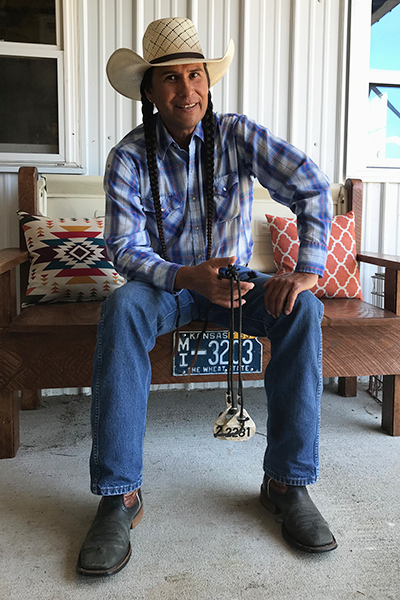
He has issued a call to Indian Country to open up their hearts to “these descendants . . . of the original horses that carried our ancestors and . . . do our part in revitalizing that culture.”
Re-wilding doesn’t require large actions, Brings Plenty explained. You don’t have to adopt a horse or contribute large sums of money; rather, you can re-wild your thoughts and actions, reframe the way you think about our connection to these horses that heal our hearts, our souls and our lands. You can tell their story and save not only their souls but human souls as well, he said.
Through this process, CANA explains, “we can return to a more natural and balanced way of life that allows us to thrive — not just survive.”
To learn more about CANA and ways to contribute to their re-wilding efforts, visit their website or follow them on social media.
(Editor’s note: This is Casey’s seventh segment in the “Hoof Beats” blog series, which describes her travels in Indian Country on horseback.)
[1] Moses Brings Plenty is also an accomplished actor, appearing in several History Channel docuseries, in the movies: “The Revenant,” “Cowboys & Aliens,” “Hidalgo,” and “Pirates of the Caribbean: Curse of the Black Pearl,” in TV series: “House of Cards,” “Hell on Wheels,” “The West” and “Yellowstone.” He has also modeled for Harley Davidson Motorcycles and Ed Hardy clothing.
References:
- https://edit.doi.gov/sites/doi.opengov.ibmcloud.com/files/uploads/FY2016_BLM_Greenbook.pdf
- http://www.capitalpress.com/Horses/20180911/lawsuit-claims-policy-will-increase-wild-horse-slaughter
- http://www.republic-online.com/graphic-online/news/miami_county/moses-brings-plenty-appears-in-hollywood-but-lives-in-miami/article_a6e97e51-7024-59bb-96ab-c64040e5c5ba.html


